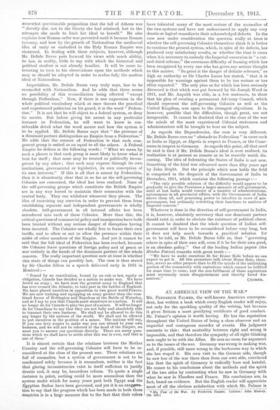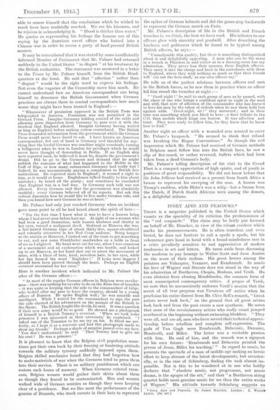AN AMERICAN VIEW OF THE WAR.*
Mn. FREDERIC'S PALMER, the well-known American correspon- dent, has written a book which every English reader will enjoy, not only for the sparkling quality of the writing, but because it gives Britain a most gratifying certificate of good conduct. Mr. Palmer's opinion is worth having. He has the reputation throughout the United States of being a close observer and an impartial and courageous recorder of events. His judgment amounts to this : that neutrality between right and wrong is impossible, and that therefore the sympathy of all right-thinking men ought to be with the Allies. Ho sees no room for argument as to the issues of the war. Germany was wrong in making war, and, if possible, still more wrong in the barbarous way in which she has waged it. His own visit to the German side, though he saw less of the war there than from our own side, convinced him that the spirit of Germany is radically base and hateful. He comes to his conclusions about the methods and the spirit of the two sides by contrasting what he saw in Germany with what he saw in Flanders and France. His conclusions are, in fact, based on evidence. But the English reader will appreciate most of all the obvious satisfaction with which Mr. Palmer is • Ms Year of (he War. By Erederlek rainier. London : John Maeray. Ns. net.]
able to assure himself that the conclusions which lie wished to reach have been truthfully reached. We are his kinsmen, and he rejoices in acknowledging it. " Blood is thicker than water." He quotes as representing his feelings the famous use of this saying by the American naval officer who butted into a Chinese war in order to rescue a party of hard-pressed British seamen.
It may be remembered that it was stated by some insufficiently informed Member of Parliament that Mr. Palmer had returned suddenly to the United States " in disgust " his treatment by the British authorities, The statement was answered in a letter to the Trines by Mr. Palmer himself, from the British Head- quarters at the front. Ho said that " affection " rather than " disgust " would be the right word to express his feelings.
Not even the vagaries of the Censorship move him much. Ho cannot understand how an American correspondent can bring himself to denounce the British Government when German practices are always there to remind correspondents how much worse they might have been treated in England :-
" Whatsoever of pessimism appeared in the British Press was telegraphed to America. Pessimism was not permitted in the German Press. Imagine Germany holding control of the cable and allowing press dispatches from Germany to pass over it with the freedom that England allowed. Imagine Germany having waited as long as England before making cotton contraband. The British Press demanded information from the government which the German Press would never have dared to ask. I have known an American correspondent, fed out of hand in Germany and thankful for any- thing that the fearful German war-machine might vouchsafe, turning a belligerent when he was in London for privileges which he would never have thought of demanding in Berlin. If an English ship were reported sunk, ho believed it must be, despite the irvernment's denial. Did he go to the Germans and demand that he might publish the rumours of what had happened to the _Moltke in the Gulf of Riga, or how many submarines Germany had really lost ? Indeed, he was unconsciously paying a compliment to British free institutions. He expected more in England ; it seemed a right to him, as it would at home. Englishmen talked frankly to him about mistakes ; he heard all the gossip ; and sometimes he concluded that England was in a bad way. In Germany such talk was not allowed. Every German said that the government was absolutely truthful ; every German believed all of its reports. But ask this critical American how he would like to live under German rule, and then you found how anti-German he was at heart."
Mr. Palmer had only just reached Germany when an incident gave some point to all he had heard about the spirit of hate :— " For the first time I knew what it was to have a human being whom I had never seen before hate me. At sight of me a woman who had been a good Samaritan, with human kindness and charity in her eyes, turned a malignant devil. Stalwart as Minerva she was, a fair-haired German typo of about thirty-five, square-shouldered and robustly attractive in her Red Cross uniform. Being hungry at the station at Hanover, I rushed out of the train to get something to eat, and saw some Frankfurter sandwiches on a table in front of me as I alighted. My hand went out for one, when I was conscious of a movement and an exclamation which was hostile, and looked up to see Minerva, as her hand shot out to arrest the movement of mine, with a blaze of hate, hard, merciless hate, in hor oyes, while her lips framed the word, ' Englishcr 1 ' If looks were daggers I should have been pierced through the heart. Perhaps an English overcoat accounted for her error."
Here is another incident which indicated to Mr. Palmer the ethos of the German officer :— " As most of the regular German officers in Belgium were cavalry. men—there was nothing for cavalry to do on the Aisne line of trenches --it was quite in keeping. that the aide to the commandant of Liege, who looked after my pass to leave the country, should bo a young officer of Hussars. He spoke English well ; ' ho was amiable and intelligent. While I waited for the commandant to sign the pass the aide chatted of his adventures on the pursuit of the British to the Marne. The British fought like devils, he said. It was a question if their now army would be so good. Ho showed me a photograph of himself in a British Tommy a overcoat. When we took some prisoners I was interested in their overcoats,' he explained. I asked one of the Tommies to lot me try on his. It fitted me per- fectly, so I kept it as a souvenir and had this photograph made to show my friends.' Perhaps a shade of surprise passed over my face.
You don't understand, he said. That Tommy had to give me his coat He was a prisoner.".'
It is pleasant to know that the Belgian civil population some- times got their own back by their freezing or bantering attitude towards the military tyranny suddenly imposed upon them.
)3elgian skilled mechanics found that they had forgotten how to make materials of war when the Germans tried to press them into their service. There is no military punishment which can restore such losses of memory. When Germans entered tram- cars; Belgian women would gather their skirts about them
as though they feared to be contaminated. Men and women walked wide of German sentries as though they were keeping clear of a pestilence. But we like most the performance of the gamins of Brussels, who stuck carrots in their hats to represent the spikes of German helmets and did the goose-step backwards to represent the German march on Paris.
Mr. Palmer's description of life in the British and French trenches is, we think, the best we have read. His tributes to our officers glow with sincerity and goodwill. After describing the kindness and politeness which ho found to be typical among British officers, ho says :-
" ueanalysable this quality, but there is something distinguished about it and delightfully appealing. A man who can be the same in a trench in Flanders in mid-winter as in a drawing-room has my admiration. They never lose their manner, these English officers. They carry it into the charge and back in the ambulance with them to England, whore they wish nothing so much as that their friends will cut out the hero stuff,' as our own officers say."
He tells us of the perfect relations between officers and men in tho British forces, as he saw them in practice when an officer led him round the trenches at night :—
" ' Good night 1' ho said to each group of men as he passed, with the cheer of one who brings a confident spirit to vigils in the mud and with that note of affection of the commander who has learned to love his mon by the token of ordeals when he saw thorn hold fast against odds. Good-night, sir ! ' they answered ; and in their tone was something which you liked to hear—a finer tribute to the 0.0. than medals which kings can bestow. It was affection and trust. They were ready to follow him, for they know that ho knew how to lead."
Another night an officer with a wounded arm wanted to carry Mr. Palmer's knapsack. " He seemed to think that refusal was breaking the Hague Conventions." As though the evil impression which Mr. Palmer had received of German methods
in Belgium must follow him into the British lines, he saw a clip of flat-nosed, or rather reversed, bullets which had been
taken from a dead German's body.
Mr. Palmer's telling description of his visit to the Grand
Fleet is a compact appreciation of high spirits, and of youth in positions of great responsibility. We did not know before that Sir John Jellicoe had received as a present from South Africa a broom to represent his sweeping of the seas. A broom was Tromp's emblem, while Blake's was a whip—but a broom from
the Dutch,' if Dutch South Africans were among the donors, is a delightful tribute.











































 Previous page
Previous page